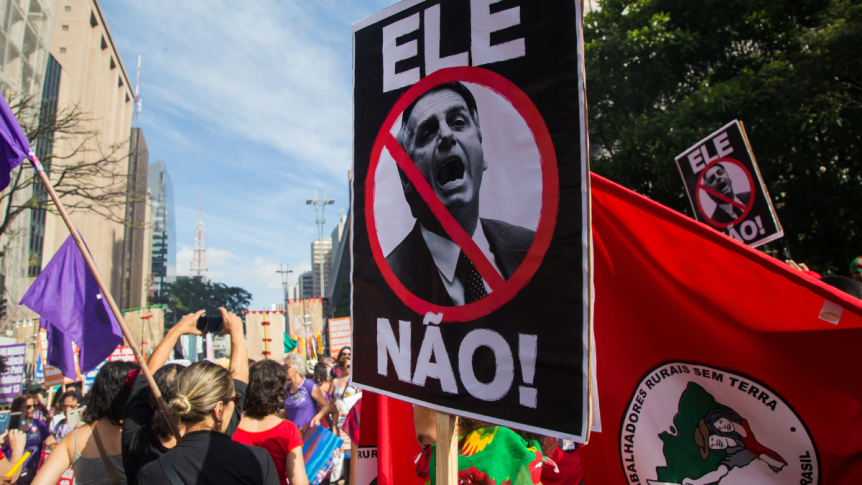By Annaís Berlim, Brazil Matters
The 2023 Annual Report of the Brazilian Public Security Forum, published at the end of July, included, in addition to all the public security issues covered in the report, the frightening data on violence against women and girls in 2022, Bolsonaro’s last year in office.
The data published in this report corresponds to administrative records, i.e. records of reports to the police, calls to 190 (the Military Police’s emergency number) and requests for protective measures to the judiciary. These are the cases that reached the authorities after girls and women sought help from the State. The number of violent deaths in the country has fallen, but the number of femicides has risen.
Femicides rose by 6.2% in 2022, and attempted femicides increased by 9.3%. In addition to crimes against life, assaults in the context of domestic violence rose by 2.9%; threats rose by 7.2%, and calls to 190 reached an average of 102 calls per hour. Sexual harassment rose by 49.7% and sexual harassment by 37%; more than 88% of rape victims in the country were women.
Every hour, eight rapes are reported in Brazil and 205 cases of rape are reported every day. In a record number, there were more than 74,000 victims in 2022 alone. Six out of ten victims are under 13 years of age; 20% of victims are young boys. Records of domestic violence have also risen by more than 8,000, and these are the cases that most often lead to femicide.
The figures also reaffirm the racism that permeates all Brazilian structures. More than 61 % of the victims of femicide in 2022 were black women. In other cases of murders of women, where the determining factor is not the fact that she is a woman, the figures are even higher: more than 68% of these victims were black women.
The Annual reports on the large number of underreported cases of violence against LGBTQI+ women and stresses the importance of following up on reports made by civil society organisations, such as ANTRA (National Association of Transvestites and Transsexual).. ANTRA reported 131 cases of homicide in which the victims were trans women or transvestites, which means that Brazil remains top 1 in the global ranking of murders of trans people.
Femicide is the last layer of violence. Until they reached homicide, these women were most likely suffering emotional and psychological violence. The number of calls to the police emergency number, the main safety tool for women in an emergency, was 102 every hour for help in cases of domestic violence, and the numbers of femicides are higher among cases of domestic violence.
Unlike the UK, in Brazil we have gender-based legislation aimed at protecting women. The Maria da Penha Law, a mechanism designed to protect the physical, psychological, sexual, property or moral integrity of women in situations of violence or their dependents, allows access to Emergency Protective Measures for survivors of abuse. It is striking that, according to the Annual report, 85% of requests for emergency protective measures were granted, and we have to bear in mind that there are still many judicial barriers to women survivors of violence seeking help from the State.
Experts say that this figure could be up to ten times higher due to the underreporting of cases. According to an IPEA (Institute for Applied Economic Research) estimate, the police record only 8.5 per cent of rape cases and health organisations only 4 per cent.
It’s important to mention that only 12% of the police force is made up of women, and that due to fear of re-victimisation and/or criminalisation of the victims, many cases don’t reach the police, and the Organic Law, approved on 11 July by the Senate, will further limit women’s access to this institution, proposing that only 20% of women will be able to join the Military Police.
The annual report highlights three reasons as the main explanatory factors for the increase:
“The de-funding of women’s protection policies by Jair Bolsonaro’s administration, which registered the biggest funding cut in 10 years; The impact of the covid-19 pandemic on women’s reception and protection services, which in many cases had restrictions on opening hours, a reduction in care teams or were even discontinued; And finally, there is no way to dissociate the scenario of growing hate crimes from the rise of ultraconservative movements in Brazilian politics, which have elected the debate on gender equality as enemy number one.”
- Annaís Berlim is an organiser for Brazil Matters, a campaign raising awareness of Brazilian issues and promoting the rights and fights of Women, Workers, Black, Indigenous and LGBT+ in Brazil.
- you can follow Brazil Matters on Facebook, X (formerly Twitter) and Instagram.
- This article was originally published by Labour Outlook on August 22nd, 2023.
Featured image: Brazilian women demonstrate against Bolsonaro as part of the Ele Nao (not him) marches on October 22nd, 2018. Photo credit: Sâmia Bomfim under Attribution 2.0 Generic (CC BY 2.0)


